Heat anxiety and grief over land loss: Climate change sends us to therapy
Climate change is already wreaking havoc on the mental health of Latin Americans. Experts call for more research and recommend what actions need to be taken
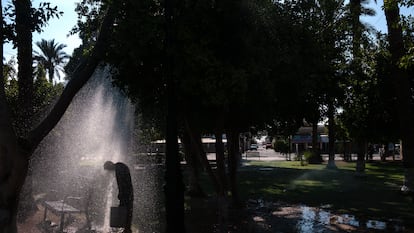
In the hottest months of 2024 — a year in which Mexico (and the world) reached record-high temperatures — Yanine Quiroz began to experience fatigue and anxiety. This prevented her from working during the day. “I was very afraid to see the water shortage and how all my family and friends were suffering,” the 33-year-old journalist sighs. She’s from Ecatepec, one of the municipalities most affected by the drought in the State of Mexico (Edomex), made up of the areas surrounding the capital. Last year, there were fears that “day zero” had arrived, when drinking water reserves would run out.
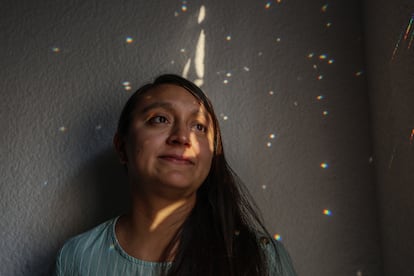
Various studies have confirmed that prolonged exposure to heat affects physical and mental health, increasing the risks of exhaustion, heatstroke, mood disorders, anxiety… and even suicidal thoughts. In Quiroz’s case, climate-related worries were compounded by an already-acute bout of anxiety. She began experiencing panic attacks, leading her to request sick leave from her job. Subsequently, she sought professional help. Thanks to this, she’s now able to speak more openly about her mental health.
Quiroz believes that she was suffering from what has been termed “eco-anxiety,” or a state of agitation, restlessness, or anxiety in the face of the climate crisis. This concept — popularized by the American Psychological Association (APA) in its 2017 report, Mental Health and Our Changing Climate — refers to the distress and emotional discomfort a person experiences due to concern about the state of the environment and climate disasters. It’s a feeling that primarily affects younger generations and those working on environmental issues. According to the Center for Climate and Resilience Research, more than half of young people between the ages of 16 and 25 experience negative emotions such as anxiety or helplessness in the face of climate change.
With more powerful and frequent disasters — as well as more erratic weather threatening communities with droughts, floods and heat waves — it’s urgent that healthcare professionals understand the impact of climate change on mental health. This is according to Dr. Ana Laura Torlaschi, an advisor to the Pan American Health Organization (PAHO) for projects on health and climate change. “You may have in-depth knowledge about diseases, but if you don’t recognize that a person is exposed to environmental factors that affect them, you won’t be able to offer appropriate help,” she points out.
Mental health in climate disasters
People who experience a natural disaster firsthand are at risk of acute impacts on their mental health. This was the case for 35-year-old Diana Ruiz and her mother, who were unprepared for the arrival of Hurricane Otis in 2023. The worst storm to hit the Mexican Pacific in more than three decades, it devastated the resort city of Acapulco.
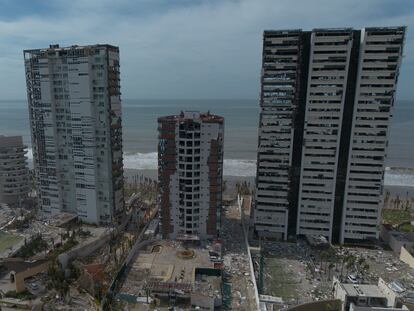
Otis took only 12 hours to go from a tropical storm to a Category 5 hurricane, the strongest possible. This was something unprecedented. Faced with the rapid strengthening of the cyclone, mother and daughter were unable to evacuate and had no choice but to lock themselves in the bathroom of their Acapulco home with their cat, waiting for it to pass. “It was a shock. We were scared. We tried to sleep, but there was a very strange wind noise,” Ruiz recalls. In the morning, they were able to assess the damage: doors, sheet metal and pieces of the stove and roof were lying on the floor. The store where they sold accessories and clothing was also damaged. In the following weeks, the challenge was to find food and prevent burglars from entering their home. “My mom endured a lot of pain. We didn’t cry,” the daughter notes. “A while later, [we started to think about] everything that happened.”
After the hurricane, psychologists from Doctors Without Borders and the state of Guerrero went to attend to the mental health of people in Acapulco and Coyuca de Benítez, two of the hardest-hit municipalities. “We arrived during what’s considered to be the immediate post-disaster phase,” explains Berzaida López, the organization’s mental health intervention manager. She notes that, during this stage, a sense of disbelief prevails. Those affected feel as if they’re living a nightmare.
“Stress is very high in those first few days. People talk about having difficulty sleeping, being startled, or being on constant alert,” López lists. “If a strong wind came and made noises associated with the hurricane, people would relive the trauma,” she adds. These flashbacks — the reliving of the hurricane — are signs of acute stress.
The importance given to mental health and the fact that there are professionals who care for people after natural disasters is relatively new. In 2011, after the Tōhoku earthquake and tsunami, which killed more than 18,000 people and left survivors with acute mental health problems, the UN’s Sendai Framework for Risk Reduction was created. This recommends improving recovery plans and offering psychosocial support to those affected. Emerging evidence, especially in Latin America, shows that these events can cause depression, anxiety, post-traumatic stress disorder, substance abuse, and suicidal behavior, underscoring the framework’s importance.
More than two years after Hurricane Otis, mental health is still a challenge for Diana and her mother. The daughter is suffering from the dengue fever that she was diagnosed with after Otis, an illness that skyrocketed after the disaster. The disease also inflicted a blow to the local economy and led Diana to move to Mexico City.
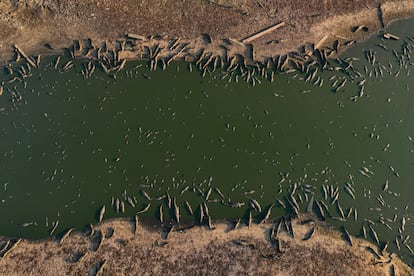
Beyond the disaster: The pain of losing the landscape
Eco-anxiety also affected Regeane Oliveira Suares, a young Terena woman who left her Indigenous community more than six years ago to study medicine at the State University of Mato Grosso do Sul (UEMS) in Campo Grande, southern Brazil. Since then, her mental health has been affected by uprooting and the gradual loss of her territory.
“I left a small town where everyone knew each other and the routine was different. When I started living in the city, my mental health suffered greatly. I began to develop depression and anxiety,” she recalls. In her village, everything gave her a sense of freedom. She could walk or ride a bike safely. But if leaving her community was a challenge, so was returning and seeing that the land and landscape had changed. “I noticed drastic changes in the crops; the lack of rain impoverished the soil, while the harsh sun wiped out most of what was grown to eat or sell.” The river became increasingly dry and often even diverted, creating a landscape she describes as “sad.”
Added to Oliveira’s uprooting was what philosopher Glenn Albrecht described as “solastalgia” in 2005. This is the “pain experienced when one recognizes that the place where one lives and loves is under attack.” It’s a kind of mourning for the loss of a familiar place. “I think my children might not see what I was a part of, where I grew up. This depresses me even more because, little by little, I saw that place crumbling before our eyes,” Oliveira sighs.
In 2021, Oliveira participated in a UEMS School of Medicine research project led by Professor Antonio Grande, to explore the actions needed to improve Indigenous mental health in relation to climate change. “These communities are losing their perspective on life [and a sense] of hope. So, for them, everything that happens has a deeper meaning,” Grande tells EL PAÍS in a video call. “At this point, everything has to do with climate change. The lands have been devastated and [the people] can no longer communicate with nature. Some even say they can no longer hear it.”
The research proposes preserving Indigenous territory, respecting their ways of life and breaking the taboo surrounding mental illness that exists in these communities. “It’s a political thing, which begins with not destroying their lands,” the researcher comments. The project that Grande leads is one of the few studies on mental health and climate change conducted in Latin America. It provides clues about the transformation that the region needs to begin addressing, given that the issue has, historically, been stigmatized.
Oliveira, for her part, shares her insights as an Indigenous person about to graduate as a doctor. “Medical schools need to work on this relationship. Governments must guarantee the right to ancestral land and financial assistance. And schools must offer education about our origins, our rights and our values as human beings in society,” she emphasizes.
Action: A path toward mental health
As adverse climate events increase, more people will feel their mental health affected. Psychiatrist Nora Leal Marchena who, back in 2023, pushed for the creation of the Environmental and Urban Mental Health Chapter within the Argentine Association of Psychiatrists, affirms the importance of taking concrete actions to manage these emotions. “When you begin to work on an issue, actions drive positive responses that help mitigate the concern.”
The magnitude of the problem on a global scale can lead to the apocalyptic “it’s already too late” mental picture. But at least, on a mental level, taking action is healing. Marchena sees that this is especially the case with children and adolescents. She specializes in the mental health of young people and feels that their future is being denied. “We must encourage them to take action, because otherwise, you generate powerlessness.”
Dr. Alice Poma, who researches emotions and social movements at the National Autonomous University of Mexico (UNAM), corroborates this. “One of the research findings is that activism is almost therapeutic when it comes to climate emotions,” the social scientist explains. Finding hope in collective action — in creating spaces for discussion — allows us to think about a different future. “The affection or emotional bonds formed through collaboration help us not be so afraid of the dystopian future we imagine,” she concludes.
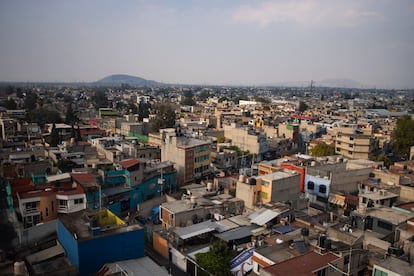
That’s why people like Yanine Quiroz are seeking strategies to cope with the emotional impact of extreme weather. “I have some ideas in mind for short-term responses to future situations that could trigger eco-anxiety again,” she notes. Her strategies range from individual solutions such as air-conditioning her living space to collective actions, such as participating in reforestation projects via NGOs. “But fear definitely emerges every time the heat becomes more intense.”
Credits
Translated by Avik Jain Chatlani
Sign up for our weekly newsletter to get more English-language news coverage from EL PAÍS USA Edition
Tu suscripción se está usando en otro dispositivo
¿Quieres añadir otro usuario a tu suscripción?
Si continúas leyendo en este dispositivo, no se podrá leer en el otro.
FlechaTu suscripción se está usando en otro dispositivo y solo puedes acceder a EL PAÍS desde un dispositivo a la vez.
Si quieres compartir tu cuenta, cambia tu suscripción a la modalidad Premium, así podrás añadir otro usuario. Cada uno accederá con su propia cuenta de email, lo que os permitirá personalizar vuestra experiencia en EL PAÍS.
¿Tienes una suscripción de empresa? Accede aquí para contratar más cuentas.
En el caso de no saber quién está usando tu cuenta, te recomendamos cambiar tu contraseña aquí.
Si decides continuar compartiendo tu cuenta, este mensaje se mostrará en tu dispositivo y en el de la otra persona que está usando tu cuenta de forma indefinida, afectando a tu experiencia de lectura. Puedes consultar aquí los términos y condiciones de la suscripción digital.








































